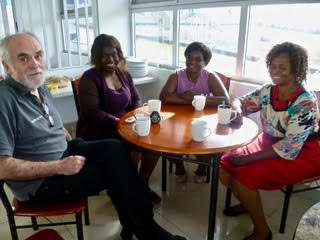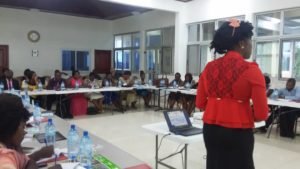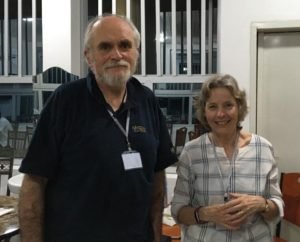
Because of the civil unrest in Cameroon, some participants from the North West and South West Regions, which are the worst affected by violence, had difficulty travelling. There are weekly ‘ghost towns and ‘lock downs’ in these regions, when no shops or schools are open and there is no public transport.
Nurses and doctors are forced to sleep on the floor in the hospital at these times. Pregnant women have difficulty reaching hospitals and health centres. Three instructors from Bamenda NW Region, where we ran the first course in 2014, managed to get to Yaounde to teach.







 This is Alison and Jarlath, busy in Cameroon mentoring 12 local instructors through their instructor candidate newborn care courses. We use the UK model for training instructors. They first have to do a two day very intense instructor training course known as the generic instructor course (GIC). Then they have to teach on 2 newborn care courses but are supervised during that time by a more senior instructor. At the end of this they are fully fledged newborn care course instructors. It is quite demanding training, the same as the UK advanced life support instructors go through, but is one of the best short instructor training courses available. The NICHE instructors are on site this week to complete the training of the 12 local instructors who did their generic instructor course this time last year. As a team, we are very heartened by this step. It is step 8 in our sustainability plan and means that we can remove ourselves from Cameroon for a few years. Step 9 and 10 will take place when the trained local instructors have done enough courses to start training as instructor trainers themselves. We hope to be invited back for that stage in two or three years time.
This is Alison and Jarlath, busy in Cameroon mentoring 12 local instructors through their instructor candidate newborn care courses. We use the UK model for training instructors. They first have to do a two day very intense instructor training course known as the generic instructor course (GIC). Then they have to teach on 2 newborn care courses but are supervised during that time by a more senior instructor. At the end of this they are fully fledged newborn care course instructors. It is quite demanding training, the same as the UK advanced life support instructors go through, but is one of the best short instructor training courses available. The NICHE instructors are on site this week to complete the training of the 12 local instructors who did their generic instructor course this time last year. As a team, we are very heartened by this step. It is step 8 in our sustainability plan and means that we can remove ourselves from Cameroon for a few years. Step 9 and 10 will take place when the trained local instructors have done enough courses to start training as instructor trainers themselves. We hope to be invited back for that stage in two or three years time.